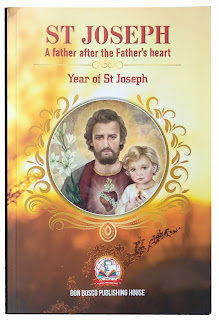Holy Week
Holy Week is a unique and grace-filled time of the year. This
is a week that is exalted both in character and in significance. It
commemorates and celebrates the central events of the Christian faith. These
events encapsulate the core tenets of Christianity. This is no ordinary week.
As its name suggests it is steeped in spiritual significance.
Holy Week begins with Palm Sunday. This is a remembrance of
Jesus’ triumphant entry into Jerusalem a short time before his death. Jesus
rode into town seated on a colt and the people came out in great numbers to
welcome and honour him. They ‘spread their cloaks on the road, and others cut
branches from the trees and spread them on the road. The crowds went ahead of
him and that followed were shouting, “Hosanna to the Son of David! Blessed is
the one who comes in the name of the Lord!”’(Mt 21:8-9) In those days it was
common for kings to return to their kingdoms after long journeys or wars riding
triumphantly on their horse. The people would gather in the streets to welcome
their hero. Jesus, the Bible tells us, did not come triumphantly on a horse but
rather on a humble colt. This signified the kind of kingship he embraced. He
wasn’t one to show off his power and prestige, or to bask in his own glory. His
kingship was not of this world (Jn18:36) and hence he wasn’t like any earthly
king. This event however is important in order to understand the inscription
placed over his head at the time of his crucifixion. It read: Jesus of Nazareth
King of the Jews. The Bible tells us that Pilate wrote it in four languages but
contemporary artists continue with the Church’s preferred linguistic choice:
Latin. Hence you will find INRI (Iesus Nazarenous Rex Iudaeorum) inscribed over
Jesus’ head in any painting, sculpture or artistic depiction. In keeping with
Biblical tradition, Christians use blessed palms in their worship on this day
and make a procession, hailing Jesus as their King.
The next important day in Holy Week is Maundy Thursday or
Holy Thursday. Derived from the Latin word mandatum, meaning "commandment," Maundy refers
to the commands Jesus gave his disciples at the Last Supper: to love with
humility by serving one another and to remember his sacrifice. It is the first
day of the Easter triduum or the first day in preparation for Easter. Jesus
shared a last meal with his disciples before he was betrayed and killed. Before
they began to eat Jesus did something the disciples couldn’t comprehend and
Christians find hard to imitate. He rose from the table took off his outer
robe, and tied a towel around himself. Then he poured water into a basin and
began to wash the disciples’ feet (Jn 13:4-5). The Master washed the feet of
his disciples and asked them to do likewise (Jn 13:14). This is the first of
the three events that Maundy Thursday commemorates. The second is the
Institution of the Priesthood. Jesus presided over the meal and through his
words and actions established a new kind of priesthood. He showed by example
that a priest is a mediator between God and man. His service ought to be
servant-like. The third event is the Institution of the Holy Eucharist. Jesus took
bread and when he had given thanks he broke the bread and gave it to them,
saying, “This is my body, which is given for you. Do this in remembrance of me.”
And he did the same with the cup after supper, saying, “This cup that is poured
out for you is the new covenant in my blood (Lk 22:19-20).” These actions form
the core of the Holy Eucharist or Mass which is celebrated daily in churches
across the globe. The Eucharistic bread and wine are consumed as the real body
and blood of Jesus. Jesus himself said “Take this my body … and drink this my
blood in remembrance of me (1 Cor 12:23-25).”
Good Friday follows Maundy Thursday and it is the day on
which Jesus died. His death was preceded by a painful betrayal, an unfair
trial, vile insults and painful torture. On this day, Christians are invited to
relive the Passion of Jesus as He suffered and died for the sake of the entire
human race. Jesus was God and He didn’t require to go through all this
suffering to redeem humankind from the clutches of evil. Yet, He chose to do
so. No other religion records such a sacrifice. This is indeed a confounding
and controversial belief that Christians hold and proclaim: God died for Man.
It raises a multitude of questions and may even seem superfluous to some.
Nevertheless, it stands as a testimony of love and bears a universal message
that was taught by Jesus himself namely, “No one has greater love than this, to
lay down one’s life for one’s friends”(Jn 15:13).
Holy Saturday is a preparation day for the great feast of
Easter. The single most fantastic and yet crucial claim in all of human
history: Jesus was crucified and buried and on the third day he rose again. This truth is the
cornerstone of the Christian faith. One of the early converts who later went on
to become one of the greatest missionaries, St Paul, writes in one of his
letters to the early believers: “If Christ did not rise again, then empty is
our preaching and your faith is in vain” (1 Cor 15:14). The feast of Easter is
the greatest feast in the Christian religion but due to its low marketing
possibilities it has been relegated to a celebration of secondary importance.
It forms however, the crux of the Christian faith and this point cannot be
emphasized enough.
As Holy Week commences, Christians prepare to enter into an
intense spiritual journey with the Lord Jesus. The events that unfolded during
this week have changed the course of human history whether people of the modern
world accept it or not. If the spirit of Holy Week is lived then it has the potential
to change lives and alter destinies. This is a favourable time. These are the
days of salvation.





Comments
Post a Comment